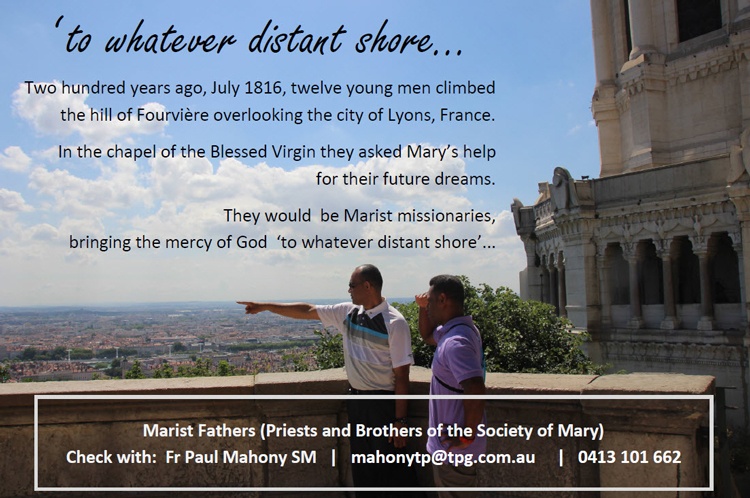Fr Colin said when he was Superior General:
My dear confreres, may the closest bonds of charity unite us always, may we truly be but one heart and one soul. The Society of Mary must make present once again the first times of the Church. (September 21, 1846, in A Founder Speaks, 115,5.)
Justin Taylor SM writes:
The quality of common life of the first believers is expressed in the phrase that we read in Acts 4:32: ‘one heart and one soul’. This phrase comes frequently to the lips of Jean-Claude Colin, generally in its Latin form: cor unum et anima una. …. Luke in Acts makes it clear that this unity is not simply wishful thinking or vague sentiment. Nor does it exist automatically. It doesn’t just happen. On the contrary, unity has to be constructed, sometimes painfully. Furthermore, the unity of which Luke writes is not simply uniformity. Finally, …. the unity of the first believers is constructed around and even by Mary. By exercising a role of mediation or even reconciliation, Mary ‘supports’ the newborn Church. This is the paradigm of the ‘work of Mary’, in which Marists are called to take part. (Justin Taylor SM, notes for a retreat, “The Earliest Church, Sole Model of the Society of Mary” (Session 3).)
This theme is very much part of Fr Colin’s sense of the early Church and Mary’s role in it. Nazareth is crucial to that role. It is also a theme that remains a huge challenge for the Church in every age and every culture: Unity in diversity. It is a unity that is given, a unity that exists already but – more often than not – is buried under selfishness, ignorance, laziness, carelessness, and any number of ordinary human frailties. For Fr Colin, Mary the Mother of Jesus is an instrument of this unity.
Ultimately the unity about which we speak is the unity of our being in Christ: We are “baptized into union with Christ” (Galatians 3:27. See also Romans 6:3). Thus “you are all one” (Galatians 3:28). “For just as the body is one and has many members, and all the members of the body, though many, are one body, so it is with Christ. For by one Spirit we were all baptized into one body – Jews or Greeks, slaves or free – and all were made to drink of one Spirit” (1 Corinthians 12:12-13). And so Paul can say: “There is neither Jew nor Greek, there is neither slave nor free, there is neither male nor female; for you are all one in Christ Jesus” (Galatians 3:28).
There is a radical tension arises with this focus on community: What about mission? It is clear from the words of Fr Colin that community is not necessarily a block to mission nor is mission a block to community. In fact a certain mutuality means that it is realistic to expect both to thrive, each because the other is thriving. On the occasion of a retreat, Fr Colin said:
Messieurs, you have all tasted the happiness to be experienced at finding ourselves together. You have grasped all the truth of those words of the Psalm: ‘Oh! How good it is, how pleasant, for brothers to be together! ….’ Now we are about to go each to the place obedience will indicate to us; but we will not be separate for all that, remaining united by bonds of one same spirit and one same charity. We are about to depart like apostles after their retreat in the cenacle, and are going to continue their work. (September 1849, in Mayet 7,747f.)
The reality of community comes to birth through a humble and persistent commitment to living together. A simple expression by Fr Colin is both wise and practical:
Let us show one another not only charity but civility and respect. Let us respect and honor one another. (September 11, 1850, A Founder Speaks, 181,3.)
Living the ideal of one heart and one soul is a graced journey, a pilgrimage that will never end. The hard and persistent work notwithstanding, the reality community emerges as gift rather than conquest. The reality will be manifest in the gracious manner with which the members relate with each other – especially when under pressure.
